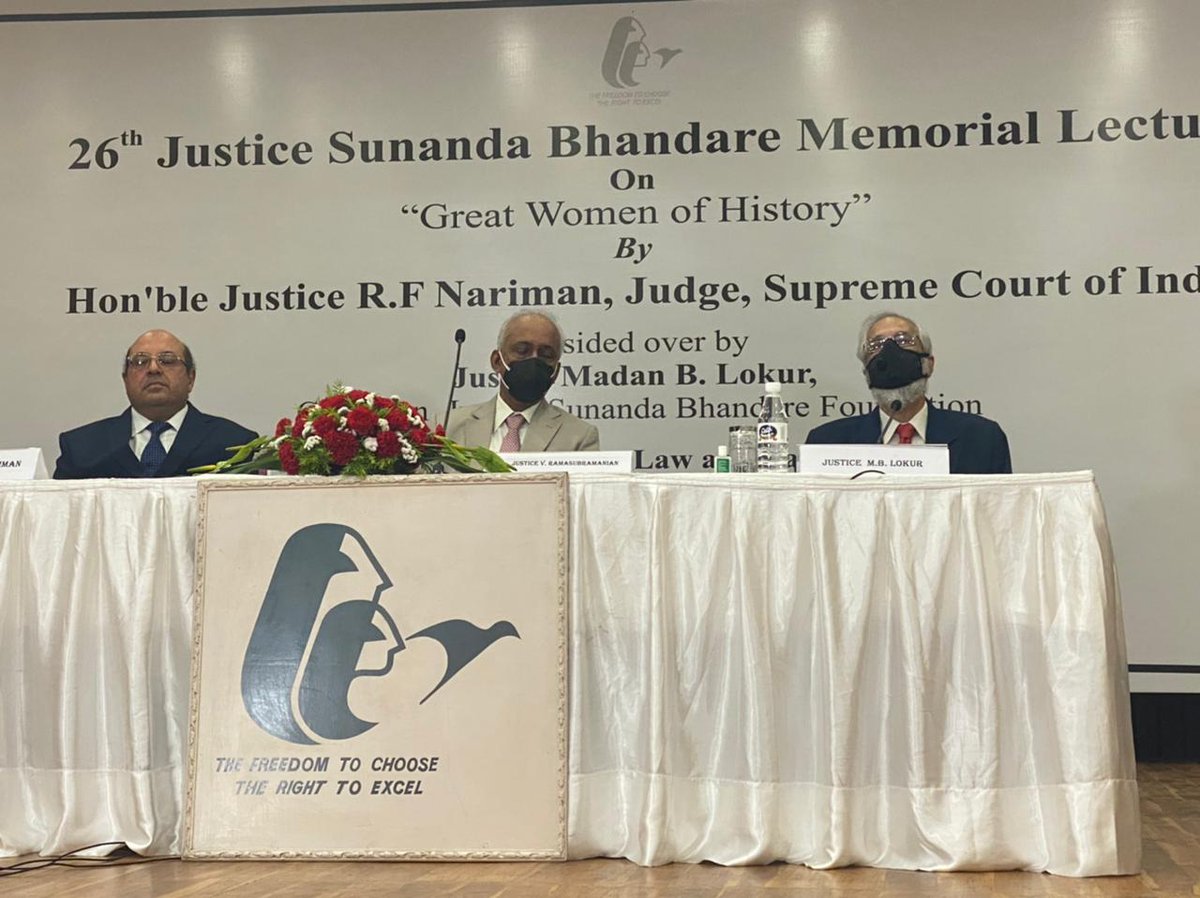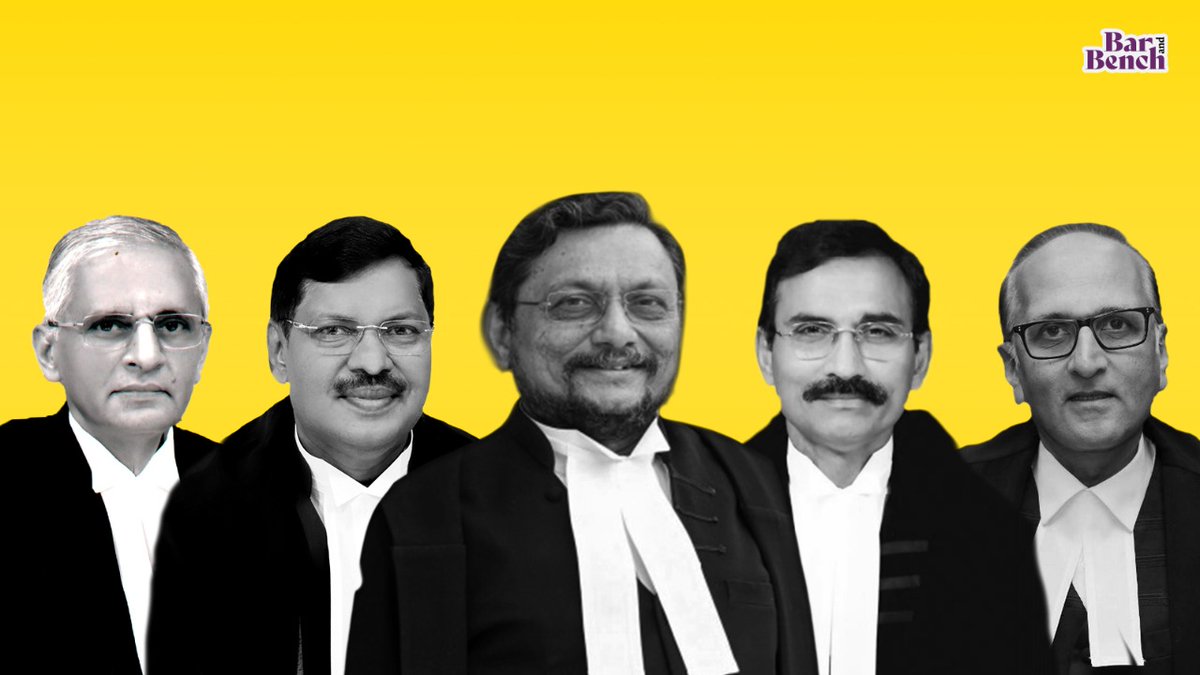
Chief Justice of India SA Bobde to release co-authored strategy paper by @Vidhi_India on the responsible use of artificial intelligence in the Indian justice system today at 6.30 pm
Other speakers at the event include Justice L Nageswara Rao and retired Justice BN Srikrishna.
Other speakers at the event include Justice L Nageswara Rao and retired Justice BN Srikrishna.

The event will begin shortly. The speakers have joined in the event. There are some technical glitches which are being sorted out at the moment.
#artificial_intelligence
#artificial_intelligence
Event begins. Dr. Arghya Sengupta from Vidhi Legal Research Centre welcomes the panel.
#artificial_intelligence
#artificial_intelligence

CJI Bobde ceremoniously launches the paper by holding it up for the panel and the viewers to see.
#artificial_intelligence
#artificial_intelligence

Retd. Justice Srikrishna begins his address. Congratulates the authors for their commendable work.
#artificial_intelligence
@Vidhi_India
#artificial_intelligence
@Vidhi_India
Retd. Justice Srikrishna: As the title says, artificial intelligence has to be responsible. It is means to an end, not the end.
If you have to have data, then you have to collect it from judicial institutions.
#artificial_intelligence
@Vidhi_India
If you have to have data, then you have to collect it from judicial institutions.
#artificial_intelligence
@Vidhi_India
Retd. Justice Srikrishna: Most judges and courts are not very comfortable with sharing data. So that will have to change. And then whatever data is collected, has to be safeguarded.
#artificial_intelligence
@Vidhi_India
#artificial_intelligence
@Vidhi_India
Retd. Justice Srikrishna: It is critical to let people know through a court website whatever work was done for the day.
#artificial_intelligence
@Vidhi_India
#artificial_intelligence
@Vidhi_India
Retd. Justice Srikrishna ends his address.
Christoph Winter begins his address.
#artificial_intelligence
@Vidhi_India
Christoph Winter begins his address.
#artificial_intelligence
@Vidhi_India
Winter: I will address two questions: Why consider AI replacing part so judicial decision making?
This is a dynamic development in the field, AI can help us eliminate bias which will give us more fair decisions.
#artificial_intelligence
@Vidhi_India
This is a dynamic development in the field, AI can help us eliminate bias which will give us more fair decisions.
#artificial_intelligence
@Vidhi_India
Winter: Law professors have predicted that more than 30% of the judicial decision making will be taken over by AI.
If this happens then that answers the next question of what questions to consider for AI replacing human decision making.
#artificial_intelligence
@Vidhi_India
If this happens then that answers the next question of what questions to consider for AI replacing human decision making.
#artificial_intelligence
@Vidhi_India
Winter: It will be considered more democratic.
Winter ends his address.
Prof. Partha P. Chakrabarti begins his address.
#artificial_intelligence
@Vidhi_India
Winter ends his address.
Prof. Partha P. Chakrabarti begins his address.
#artificial_intelligence
@Vidhi_India
Chakrabarti: Justice system can be used for analytical effectiveness, procedural efficiency (which includes pipelining, alerts, etc), scenario analysis (does a decision conflict with something else), democratisation (assistance to the public in complete and correct documentation)
Chakrabarti: Education (with the whole of AI which we cannot use directly can be used in education)
Three ways AI works - assistance to judge, aid the judge in coming to a decision and autonomy where judge may vet the decision.
#artificial_intelligence
@Vidhi_India
Three ways AI works - assistance to judge, aid the judge in coming to a decision and autonomy where judge may vet the decision.
#artificial_intelligence
@Vidhi_India
Chakrabarti: There are links to the AI for instance like critic link, interpreter link, defender link, which is required for unbiased decision making.
#artificial_intelligence
@Vidhi_India
#artificial_intelligence
@Vidhi_India
Justice Rao, who is also chairman of the Artificial Intelligence Committee begins his address.
Justice Rao: This report will be a useful piece for the judiciary. The suggestions by Justice Srikrishna in respect of the tools are well taken
#artificial_intelligence
@Vidhi_India
Justice Rao: This report will be a useful piece for the judiciary. The suggestions by Justice Srikrishna in respect of the tools are well taken
#artificial_intelligence
@Vidhi_India
Justice Rao: I agree there was not much publicity to what work we were doing. The tools that we are developing are work in progress, we have asked experts and they are working on it.
#artificial_intelligence
@Vidhi_India
#artificial_intelligence
@Vidhi_India
Justice Rao: What Justice Srikrishna suggested is that there might be comments from people who are skilled who can suggest us what we are doing and how we can do better.
#artificial_intelligence
@Vidhi_India
#artificial_intelligence
@Vidhi_India
Justice Rao: The speakers mentioned about data. We will have to look into the privacy of the data, like pending cases, etc, which we will be collecting while ensuring that there is transparency.
#artificial_intelligence
@Vidhi_India
#artificial_intelligence
@Vidhi_India
Justice Rao: AI Committee has identified four areas of implementation:
Language technology for translation
Process automation for administrative side
Legal research
Exploring potential use in other avenues
#artificial_intelligence
@Vidhi_India
Language technology for translation
Process automation for administrative side
Legal research
Exploring potential use in other avenues
#artificial_intelligence
@Vidhi_India
Justice Rao shares an anecdote with the panel pertaining to the creating SUVAS - which is translation AI tool. He says that when he was a practising advocate in Supreme Court, it would take them 2 years to translate documents.
#artificial_intelligence
@Vidhi_India
#artificial_intelligence
@Vidhi_India
Justice Rao: I had a meeting with all committees of Supreme Court and I asked them to submit about 100 judgments from the Court to test the translation tools. Machine learns faster and it learns the more it is trained. So we have reached about 91% accuracy so far.
@Vidhi_India
@Vidhi_India
Justice Rao: AI has potential use for identifying potential question of laws which will help reaching a decision faster.
We discussed this with a person with experience in the filed and developed SUPES which helps with the research.
#artificial_intelligence
@Vidhi_India
We discussed this with a person with experience in the filed and developed SUPES which helps with the research.
#artificial_intelligence
@Vidhi_India
Justice Rao: We are also trying to create a tool for administrative process automation. We want to track the cases pending for long years pertaining to senior citizens, women and public money.
#artificial_intelligence
@Vidhi_India
#artificial_intelligence
@Vidhi_India
CJI Bobde: It is fitting that Justice Srikrishna is here. It is rightly said that he is dynamic force driving the AI movement in the judiciary.
#artificial_intelligence
@Vidhi_India
#artificial_intelligence
@Vidhi_India
CJI Bobde: Undoubtedly COVID slowed down everything, but it is satisfactory that we have reached this far in what we have undertaken for bringing AI within the judiciary.
#artificial_intelligence
@Vidhi_India
#artificial_intelligence
@Vidhi_India
CJI Bobde: I was extremely impressed with Prof Chakrabarti and Dr. Winter said in their speeches. We would like Chakrabarti’s suggestion in the judiciary.
#artificial_intelligence
@Vidhi_India
#artificial_intelligence
@Vidhi_India
CJI Bobde: Just in the previous week, I was proud to launch the Artificial Intelligence portal SUPACE (Supreme Court Portal for Assistance in Courts Efficiency)
barandbench.com/news/artificia…
barandbench.com/news/artificia…
CJI Bobde: The AI Committee has been working to bring changes in the judiciary, make it modern. Futuristic judiciary is not an impossible dream.
#artificial_intelligence
@Vidhi_India
#artificial_intelligence
@Vidhi_India
CJI Bobde: Here, I must express what I have always expressed of AI and justice. I believe that justice as a response to events that take place in society is a response which involves whole of human being.
#ArtificialIntelligence
@Vidhi_India
#ArtificialIntelligence
@Vidhi_India
CJI Bobde: It is not merely a matter of cognition, of being able to process instances that have come up for judging. That is cognitive part of human mind. All the judges will hear me out.
#ArtificialIntelligence
@Vidhi_India
#ArtificialIntelligence
@Vidhi_India
CJI Bobde: There are emotions are responses which are much wider and go beyond cognition. There is sometimes an element of sock, a gruesome murder or terrible incident that take place in society.
#ArtificialIntelligence
@Vidhi_India
#ArtificialIntelligence
@Vidhi_India
CJI Bobde: There are arguments, reasoning that lead to the ultimate decision making. AI follows the basic responses of human mind to the instances. There is a natural limitation on AI. Undoubtedly AI can do wonderful job once it has all the information.
@Vidhi_India
@Vidhi_India
CJI Bobde: But the goal is not AI, it is justice. Therefore I have persistently opposed automated decision making. It is not possible for a system of justice to accept a machine however intelligent to replace a human decision.
#ArtificialIntelligence
@Vidhi_India
#ArtificialIntelligence
@Vidhi_India
CJI Bobde: These assistive tools must give us all information necessary to arrive at a correct decision in the case, as demands of the laws, justice, constitution and we will not allow it to tell us what to decide.
#ArtificialIntelligence
@Vidhi_India
#ArtificialIntelligence
@Vidhi_India
CJI Bobde: We will also not allow it to tell us what to decide, when to decide. We will only use it to provide all the information at a high speed.
#ArtificialIntelligence
@Vidhi_India
#ArtificialIntelligence
@Vidhi_India
CJI Bobde: There are things which a judge will know which an AI expert will not know There are cases which will involve 1000 pages which are written and has the same thing said in different parts.
#ArtificialIntelligence
@Vidhi_India
#ArtificialIntelligence
@Vidhi_India
CJI Bobde: How to extract information, is where AI in judiciary must end according to me. Finding out the latest position in law according to me is an important tool. It is important to maintain ethics in the AI system.
#ArtificialIntelligence
@Vidhi_India
#ArtificialIntelligence
@Vidhi_India
CJI Bobde: AI works in areas of cognition which can be represented by words, symbols, and numbers. There is a lot of emotional basis to the decision, which AI I believe cannot reach.
#ArtificialIntelligence
@Vidhi_India
#ArtificialIntelligence
@Vidhi_India
CJI Bobde: Hence I have opposed algorithmic reasons for decisions in court. One of the learnings of the pandemic and courts is that no lawyer should be left outside the purview of justice.
#ArtificialIntelligence
@Vidhi_India
#ArtificialIntelligence
@Vidhi_India
CJI Bobde: It was necessary to ensure the justice reaches all. We found that because VC and e-courts project is a technology, and therefore VC becomes entirely technology dependent, its use depends on devices which are necessary.
#ArtificialIntelligence
@Vidhi_India
#ArtificialIntelligence
@Vidhi_India
CJI Bobde: In India it augmented an inequality which already existed. Access to courts via VC depended on access to the technology. SC came up with the idea of Mobile kiosk which you can access and simply enter a court.
#ArtificialIntelligence
@Vidhi_India
#ArtificialIntelligence
@Vidhi_India
CJI Bobde: The object is to expand and ease access to justice. It must also integrate into other pillars of justice like police and legal aid. This decade will be more transformative for judiciary than before.
#ArtificialIntelligence
@Vidhi_India
#ArtificialIntelligence
@Vidhi_India
CJI Bobde: I would end with a story of hope of Benjamin Franklin who invented electricity and someone asked him what use is this silly thing.
#ArtificialIntelligence
@Vidhi_India
#ArtificialIntelligence
@Vidhi_India
CJI Bobde: Franklin was so indignant. He said, If I may ask you sir, what use is a new born baby?
I believe similarly, AI is a new born baby. I am sure it will grow to great strength and achieve great things.
#ArtificialIntelligence
@Vidhi_India
I believe similarly, AI is a new born baby. I am sure it will grow to great strength and achieve great things.
#ArtificialIntelligence
@Vidhi_India
CJI Bobde concludes his address. Event concludes with the vote of thanks to the panelists.
#ArtificialIntelligence
@Vidhi_India
#ArtificialIntelligence
@Vidhi_India
• • •
Missing some Tweet in this thread? You can try to
force a refresh









